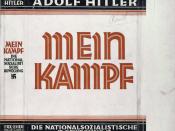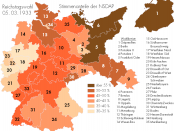The Weimar Republic (WR) was forced upon the people of Germany by their enemy after World War One (WWO). As it was a requirement of the dreaded Treaty of Versailles (TOV), the nation had little support for it. Tthe democratic WR eventually lost momentum as the Nazi party was placed in power. Various reasons contributed to this collapse, and are classed into the 'three periods' of the WR Republic. The first period was one of 'Crisis' (1918-1923), the second one of 'Relative Stability' (1923-1929) and the third one of 'Crisis' (1929-1933).
The first period of Crisis was the result of the WR attempting to establish itself as the ruling body of the country, and meeting great opposition externally and internally. The WR established itself as a coalition between 3 parties, forming a moderate-socialist government. The President was Frederich Ebert. This Reichstag agreed upon a newly developed Republican constitution, consisting of two flaws which were to contribute to the collapse of the Weimer Republic.
The first flaw was the encouraging of small political parties to take part in the elections. This was to have disastrous consequences, as the WR were unconsciously encouraging a large minority, and not a majority, to win elections, thus causing coalition governments. This unconscious arrangement of Reichstag non-unification is a reasonable contributor to the collapse of the WR, as in it's 14 years of existence, everyone of the 21 governments were a coalition. Sadly, coalitions meant bickering and disagreement as views conflicted.
The second flaw was the Article 48: Enabling Act of the constitution. This article gave special power to the president in case of an emergency including suspension of the constitution and instituting laws by decree. This was to prove deadly in the wrong hands.
The WR also experienced this initial period of 'Crisis' as...


